Unit8(2)How was your school trip
初中英语Unit-8-How-was-your-school-trip单元教学设计以及思维导图
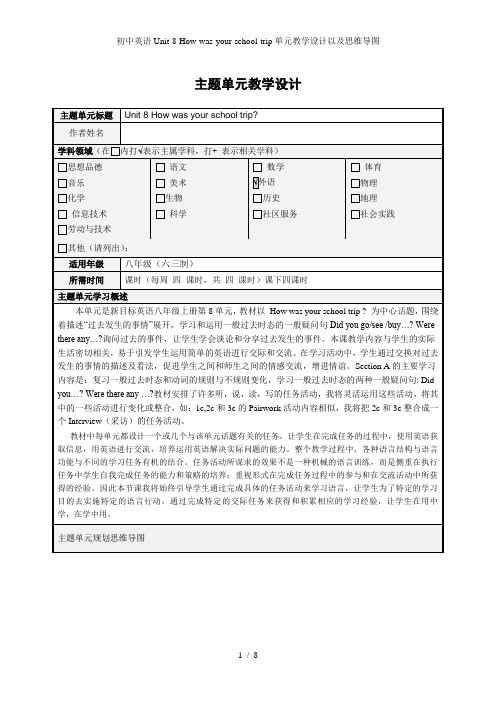
主题单元教学设计主题单元学习目标1、知识与技能:1)语言知识目标:单词:学习掌握词汇Aquarium, science center, gift shop, seal, shark, octopus, autograph, won, ate, Chicago,else等。
功能:描述过去发生的事情语言结构:规则动词和不规则动词的一般过去式;一般过去时的一般疑问句。
其他记录用钢笔及纸张leading-in步骤1:复习热身1. 课前请学生watch the screen师生一起吟唱:go, went; went, goeat, ate; ate, eattake, took; took, takebuy, bought; bought, buy2. 复习一般过去时态Use “did” to talk about the past events. The teacher makessome sentences with some words in the chant. Look at the screen. The teacher asks some questions, and Ss answer them.T: I went to the zoo yesterday. Did you go to the zoo?S1: Yes, I did. /No, I didn’t.T: Did she eat ice cream?S2: Yes, she did. /No, she didn’t.T: Did he take photos?S3: Yes, he did. / No, he didn’t.T: Did they go to beach?S4: Yes, they did. / No, they didn’t.3. 进行机械操练句子和对话,让全体学生都参与活动中来。
Get Ss to make similar sentences with them.设计意图:在音乐中have a chant,调动学生情感,营造氛围,预习本课部分重点动词的过去式;然后让学生通过看课件的图片answer the questions来培养学生的语言能力和听力能力并有意识地复习前面学过一般过去发生的事情。
Unit8_How_was_your_school_trip_1
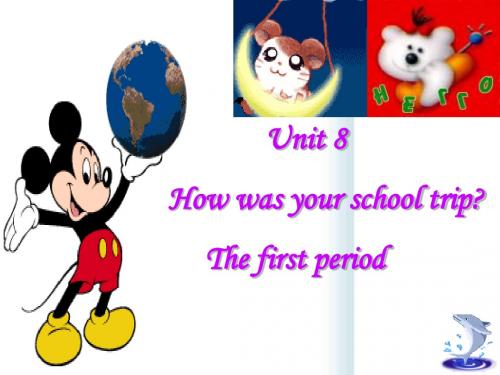
Unit 8
How was your school trip?
The first period
The rules of the past form
2
wanted needed decided lived improved
4
5
carry--carried study--studied worry—worried stop- stopped shop- shopped plan- planned go—went have--had see--saw
3
eat—ate buy–bought take–took win—won hang--hung
1b
动词过去式 went took 动词原形 go take have eat
had
ate
hung
saw
hang see
1、四人一组,分别介绍自己的上周末活动。 2、比一比谁的周末活动最精彩。
as作为.../当做... 接职业,用途,特点等。 放于句首。 后面有, eg:作为一名学生,我必须努力学习。
• 看见某人正在做某事
• see sb doing sth • 看见某人做了某事 • see sb do sth
根据汉语填空 1.我看见他正在打篮球。 I saw him playing _____basketball. 2.我看见他跑进了房间 run I saw her _____into the room.
As a student ,I must work hard.
• • • •
结果状语从句 如此。。。以至于。。。 so +adj/adv... that... 主语+adj/adv+enough to do sth可 互换 I was tired enough to sleep early.
how-was-your-school-trip-反思
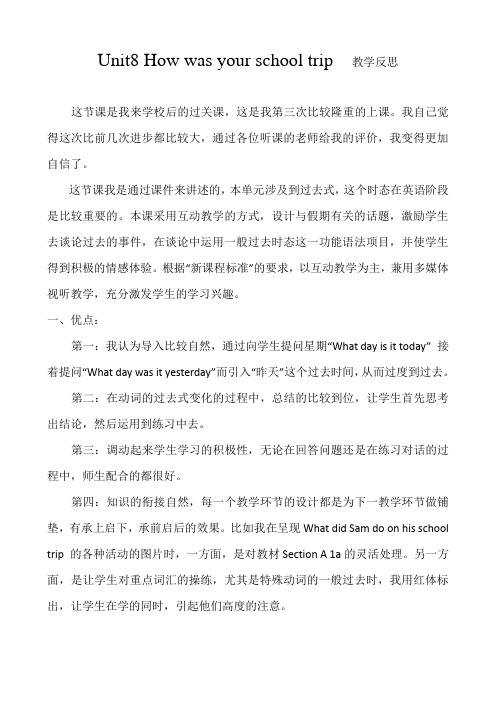
Unit8 How was your school trip 教学反思这节课是我来学校后的过关课,这是我第三次比较隆重的上课。
我自己觉得这次比前几次进步都比较大,通过各位听课的老师给我的评价,我变得更加自信了。
这节课我是通过课件来讲述的,本单元涉及到过去式,这个时态在英语阶段是比较重要的。
本课采用互动教学的方式,设计与假期有关的话题,激励学生去谈论过去的事件,在谈论中运用一般过去时态这一功能语法项目,并使学生得到积极的情感体验。
根据“新课程标准”的要求,以互动教学为主,兼用多媒体视听教学,充分激发学生的学习兴趣。
一、优点:第一:我认为导入比较自然,通过向学生提问星期“What day is it today” 接着提问“What day was it yesterday”而引入“昨天”这个过去时间,从而过度到过去。
第二:在动词的过去式变化的过程中,总结的比较到位,让学生首先思考出结论,然后运用到练习中去。
第三:调动起来学生学习的积极性,无论在回答问题还是在练习对话的过程中,师生配合的都很好。
第四:知识的衔接自然,每一个教学环节的设计都是为下一教学环节做铺垫,有承上启下,承前启后的效果。
比如我在呈现What did Sam do on his school trip 的各种活动的图片时,一方面,是对教材Section A 1a的灵活处理。
另一方面,是让学生对重点词汇的操练,尤其是特殊动词的一般过去时,我用红体标出,让学生在学的同时,引起他们高度的注意。
二、缺点:第一:开始复习单词的过程中,应该再领读一遍。
第二:本节课的内容比较多,我没有把时间把握好,在后面总结的几乎没有时间了。
第三:过度的高估学生。
学生并没有自己想象的那么优秀,以后的教学中,需要加入适当的汉语讲解。
三、改进措施:1. 在以后的对话练习过程中,应给予充分的时间让学生进行练习。
2. 在学习和操作实践之后,让学生及时总结归纳。
并正确使用目标英语句式表达。
unit8《howwasyourschooltrip》知识讲解及练习含答案(人教新目标初二上)doc初中英语
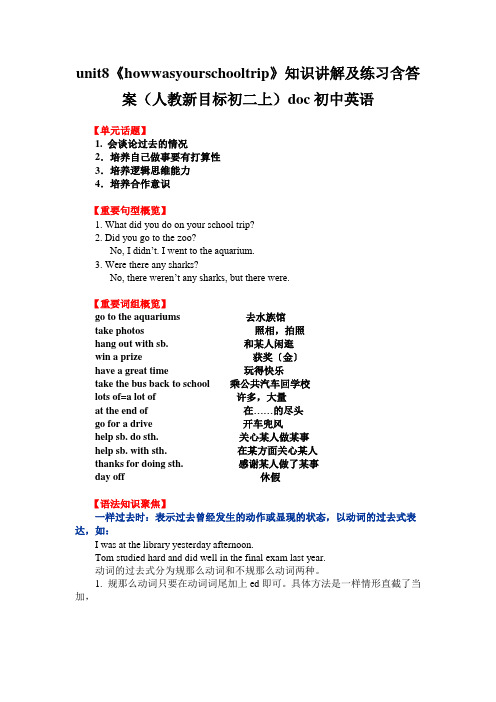
unit8《howwasyourschooltrip》知识讲解及练习含答案(人教新目标初二上)doc初中英语【单元话题】1. 会谈论过去的情况2.培养自己做事要有打算性3.培养逻辑思维能力4.培养合作意识【重要句型概览】1. What did you do on your school trip?2. Did you go to the zoo?No, I didn’t. I went to the aquarium.3. Were there any sharks?No, there weren’t any sharks, but there were.【重要词组概览】go to the aquariums去水族馆take photos照相,拍照hang out with sb.和某人闲逛win a prize获奖〔金〕have a great time玩得快乐take the bus back to school乘公共汽车回学校lots of=a lot of许多,大量at the end of在……的尽头go for a drive开车兜风help sb. do sth.关心某人做某事help sb. with sth.在某方面关心某人thanks for doing sth.感谢某人做了某事day off休假【语法知识聚焦】一样过去时:表示过去曾经发生的动作或显现的状态,以动词的过去式表达,如:I was at the library yesterday afternoon.Tom studied hard and did well in the final exam last year.动词的过去式分为规那么动词和不规那么动词两种。
1. 规那么动词只要在动词词尾加上ed即可。
具体方法是一样情形直截了当加,如:clean—cleaned;2. 词尾是不发音字母e的,可只加上d,如:like—liked;3. 词尾为重读闭音节,结尾只有一个辅音字母的,应双写该辅音字母,再加上ed,如:stop—stopped;4. 词尾为辅音字母加y的,应将y改为i再加上ed,如:study studie5. 不规那么动词有其自己的变化形式,只能分不经历。
八年级英语Unit 8 How was your school trip 人教版(新目标)知识精讲

初二英语Unit 8 How was your school trip? 人教版(新目标)【本讲教育信息】一. 教学内容:Unit 8 How was your school trip?一. 单元目标:1. 学习询问和谈论过去发生的事情。
2. 通过调查了解全班同学上周末的活动。
3. 通过描写“难忘的假日”,“秋游…”和日记摘抄,学习谈论过去发生的事情。
二. 语言结构:1. 规则动词和不规则动词的一般过去式。
2. 一般过去时的肯定句和否定句。
3. Did you, Were there引导的一般疑问句。
三. 重点词汇:1. aquarium n. 水族馆2. science center科学中心3. gift shop礼品商店4. seal n. 海豹5. shark n. 鲨鱼6. octopus n. 章鱼7. autograph n. 亲笔签名8. win v. 获胜,赢9. ate v. (eat的过去式)吃10. took v. (take的过去式)乘坐、花费11. hung out (hang out)外出12. got v. (get的过去式)得到13. go for a drive开车兜风14. sleep late 睡得晚15. yard sale 现场旧货出售16. day off 放假四. 重点短语:1. take photos 照相2. at the aquarium 在水族馆3. win a prize 获得奖品4. on the school trip 在学校旅行5. have a great time 玩得愉快6. watch a dolphin show 看一场海豚表演7. after that 那以后8. at the end of …在…结束在…末尾9. on the day off 在假日里10. all day 一整天11. e back from…在…回来五. 重难点解析:1. 复习一般过去时一般过去时态是谈论过去最常用的时态,它可以表示短暂而很快就完的动作和事情,时间较长的动作和状况以及重复发生的事情,句中通常有明确的一般过去时的时间状语。
初中英语《Unit8-How-was-your-school-trip》单元教学设计以及思维导图
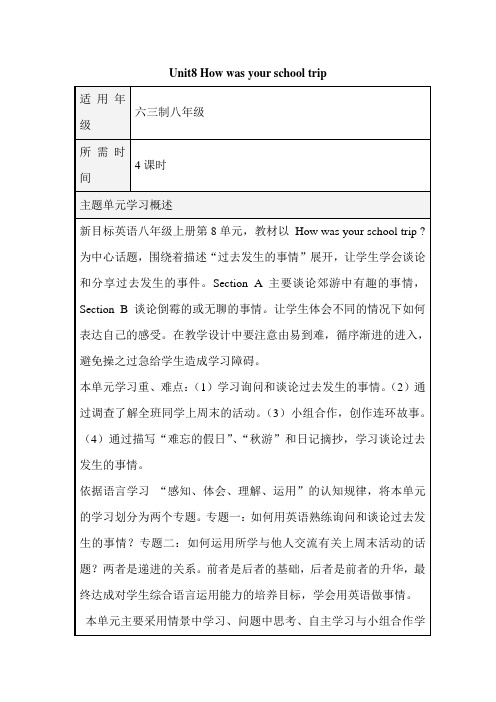
主题单元规划思维导图
主题单元学习目标
知识与技能:
1、能熟知单元主要内容,掌握相应的语言知识(单词、习惯用语、语法和功能用语)。
2、能结合所给任务,综合运用新、旧知识完成任务。
过程与方法:
1、能培养良好的听、说、读、写的能力,能运用适当的评价词对过去的学校旅行进行评价,能正确使用动词过去式对过去的活动进行准确的描述。
本单元学习重、难点:(1)学习询问和谈论过去发生的事情。(2)通过调查了解全班同学上周末的活动。(3)小组合作,创作连环故事。(4)通过描写“难忘的假日”、“秋游”和日记摘抄,学习谈论过去发生的事情。
依据语言学习“感知、体会、理解、运用”的认知规律,将本单元的学习划分为两个专题。专题一:如何用英语熟练询问和谈论过去发生的事情?专题二:如何运用所学与他人交流有关上周末活动的话题?两者是递进的关系。前者是后者的基础,后者是前者的升华,最终达成对学生综合语言运用能力的培养目标,学会用英语做事情。
学习策略:
1、搜集与一般过去时相关的资料图片;
2、相互交流自己的资料与课本资料,通过探究、模仿练习得出一般过去时的规律,达到熟练掌握与灵活运用的目的。
情感态度与价值观:
1、合理安排自己课外的学习、运动、休息、娱乐等活动形式,倡导过有意义的周末。要求学生保持愉快的心情,以积极的姿态,精神饱满地面对生活与学习。
本单元主要采用情景中学习、问题中思考、自主学习与小组合作学习相结合的学习方式。
本单元的预期学习成果:
1.听力任务完成后,学生能正确理解主要功能句的意义,模仿录音进行分角色朗读、背诵,并仿编对话。
2.根据3a阅读语篇任务所建构的篇章结构,在老师引领下,学生能对3a文段进行复述。
新目标八年级英语上册Unit 8 How was your school trip?讲解与练习
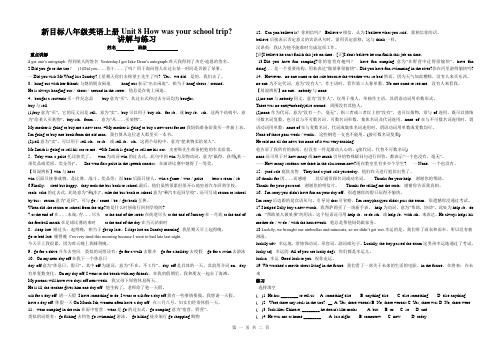
新目标八年级英语上册Unit 8 How was your school trip?讲解与练习姓名班级重点讲解1.get one‟s autograph 得到某人的签名Yesterday,I got Jake Dean‟s autograph.昨天我得到了杰克·迪恩的签名。
2.Did you go to the zoo?(1)Did you……你干……了吗?用于询问别人在过去某一时间是否做了某事。
一Did you visit Mr Wang last Sunday?上星期天你们去探望王先生了吗?--Yes,we did.是的,我们去了。
3.hung out with her friends与她的朋友闲逛hang out表示“出去闲逛”,相当于hang about/around。
He is always hanging out/about/around in the street.他总是在街上闲逛。
4.bought a souvenir买一件纪念品buy意为“买”,其过去式和过去分词均为bought。
buy与sell(1)buy意为“买”,它的反义词是sell,意为“卖”。
buy可以用于buy sth.for sb.或buy sb.sth.这两个结构中,意为“给某人买某物”。
buy sth.from...意为“从……买某物”。
My mother is going to buy me a new coat.=My mother is going to buy a new coat for me我妈妈准备给我买一件新上衣。
I'm going to buy one book from the old man.我打算从这位老人那里买一本书。
(2)sell意为“卖”,可以用于sell sth.to sb.或sell sb.sth.这两个结构中,意为“把某物卖给某人”。
Mr Smith is going to sell his car to me.=Mr Smith is going to sell me his car.史密斯先生准备把他的车卖给我。
Unit 8 How was your school trip

Unit 8 How was your school trip? 重要词组1. go to the aquariums去水族馆2. take photos照相,拍照3. hang out with sb.和某人闲逛4. buy a souvenir 买一件纪念品5. get his autograph 得到他的签名6. win a prize得奖7. win the first prize 获得一等奖8. a famous actor 一个出名的演员9. have a great time = have a good time= have fun玩得高兴10. on a school trip 在学校郊游11. go to Blue Water Aquarium蓝色水族馆12. visit the Visitors’Center参观游客中心13. watch a dolphin show 观看海豚表演14. after that 在那之后15. go to the Outdoor Pool 去户外泳池16. go to the Gift Shop 去礼品店17. take the bus back to school乘公共汽车回学校18. lots of=a lot of许多,大量19. at the end of 在……的尽头20. the class monitor 班长21. after the trip 郊游结束后22. day off休假日on my last day off 在我上一次休假日on my next day off 在我下个休假日23. go for a drive开车兜风24. help sb. do sth.帮助某人做某事help sb. with sth.25. take a class 上课26. sleep late 睡过头/懒床27. go camping in the rain 在雨中野营28. a busy day off 一个忙碌的休假日29. have fun (in) do ing sth. 做某事很开心30. rain all day 下了一整天的雨31. watch DVDs 观看DVDs32. have a yard sale 进行庭院旧货出售33. get wet 淋湿34. thanks for doing sth.谢某人做了某事35. win the first prize 获得一等奖36. in yesterday’s singing competition 在昨天的歌唱比赛中37. in the future 在未来重点句子1.How was your school trip?你的学校郊游怎么样?how 用于提问情况/状态2.Class 9 had a great time on the school trip.九班在学校郊游中玩得很开心。
人教版八年级英语上册知识点总结Unit8
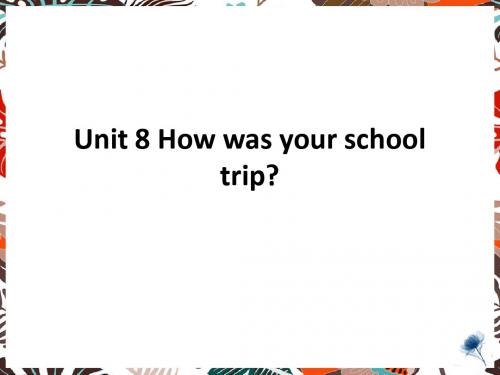
• (7)用作介词,表示事情发生的时间,用 在具体某一天前面。
• on a cold Sunday morning 周日上午
在一个寒冷的
• on May, 12th
在5月12日
• (8)用作介词,意为“关于;谈及”,含有 学术性。
• an essay on political economy 一篇政治经 济学方面的文章
• You must show your ticket at the barrier. 你必 须在检票处出示门票。
• 搭配: show sb. sth. = show sth.to sb. 把某 物给某人看
• Could you show me your photos? = Could you show your photos to me?
talk over 谈论 have a talk
have ice
go to the
• hang out with one’s friends 和朋友闲逛 buy a souvenir 买纪念品
• take photos=take a photo=take pictures=take a picture 照相
直工作,不休息。
• (2)用作副词,表示穿上、戴上(衣服、 鞋帽等)。
• Put your coat on. 穿上你的大衣。
• (3)用作副词,指(电器或电源)在接通或 使用中。
• The TV is always on in their house. 他们家电视 老是开着。
• (4)用作副词,指“(演出节目、戏剧等)在 进行中”。
• at the end of January 在1月底(表示时间)
• at the end of the street 在街道末端(表示 地点)
八年级英语Unit 8 How was your school trip知识精讲
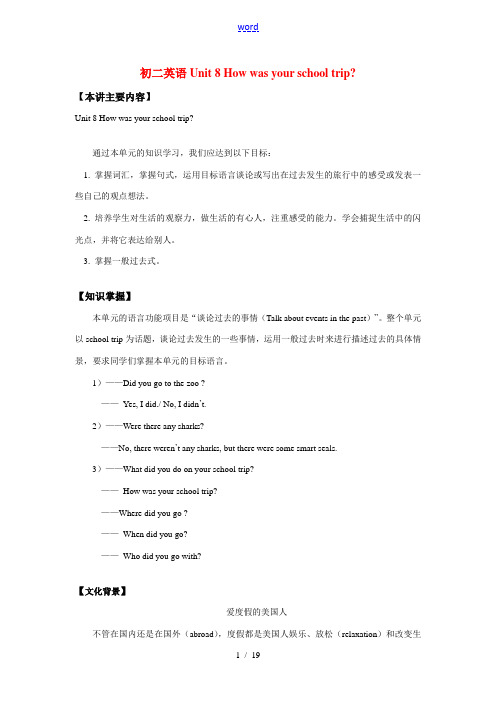
初二英语Unit 8 How was your school trip?【本讲主要内容】Unit 8 How was your school trip?通过本单元的知识学习,我们应达到以下目标:1. 掌握词汇,掌握句式,运用目标语言谈论或写出在过去发生的旅行中的感受或发表一些自己的观点想法。
2. 培养学生对生活的观察力,做生活的有心人,注重感受的能力。
学会捕捉生活中的闪光点,并将它表达给别人。
3. 掌握一般过去式。
【知识掌握】本单元的语言功能项目是“谈论过去的事情(Talk about events in the past)”。
整个单元以school trip为话题,谈论过去发生的一些事情,运用一般过去时来进行描述过去的具体情景,要求同学们掌握本单元的目标语言。
1)——Did you go to the zoo ?——Yes, I did./ No, I didn’t.2)——Were there any sharks?——No, there weren’t any sharks, but there were some smart seals.3)——What did you do on your school trip?——How was your school trip?——Where did you go ?——When did you go?——Who did you go with?【文化背景】爱度假的美国人不管在国内还是在国外(abroad),度假都是美国人娱乐、放松(relaxation)和改变生活环境的极好机会,是一家人一起过闲暇时光、相互加深了解的机会。
美国的大城市是人们旅游的热点之一。
一年到头,曼哈顿(Manhattan)的街上和酒店里都挤满了游人,他们来这里观看摩天大楼(skyscrapers)、参观博物馆和艺术画廊(art galleries)、上歌剧院(operahouses)、戏院和著名的特色商店(specialty shops)或在优雅的餐馆里就餐。
Unit8Howwasyourschooltrip
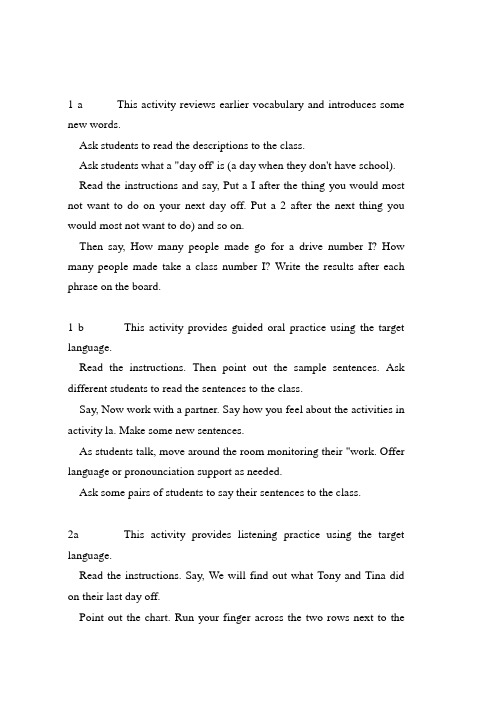
1 a This activity reviews earlier vocabulary and introduces some new words.Ask students to read the descriptions to the class.Ask students what a "day off' is (a day when they don't have school). Read the instructions and say, Put a I after the thing you would most not want to do on your next day off. Put a 2 after the next thing you would most not want to do) and so on.Then say, How many people made go for a drive number I? How many people made take a class number I? Write the results after each phrase on the board.1 b This activity provides guided oral practice using the target language.Read the instructions. Then point out the sample sentences. Ask different students to read the sentences to the class.Say, Now work with a partner. Say how you feel about the activities in activity la. Make some new sentences.As students talk, move around the room monitoring their "work. Offer language or pronounciation support as needed.Ask some pairs of students to say their sentences to the class.2a This activity provides listening practice using the target language.Read the instructions. Say, We will find out what Tony and Tina did on their last day off.Point out the chart. Run your finger across the two rows next to thenames Tony and Tina. Say, Look only at these two rows. Put a checkmark after each activity to show if Tony did it or if Tina did it. Play the recording the first time. Students only listen.Point out the sample answer. Say, There is a checkmark next to Tina's name and under the words "went camping in the rain" because Tina, not Tony, went camping in the rain.Play the recording the second time. This time students make checkmarks on the chart.Check the answers.2b This activity provides listening practice using the target language.Read the instructions. Say, What did Tony and Tina say about their last day off? Point out the list of statements. Say Write the name of the person who said each statement on these lines.Play the recording the first time. Students only listen.Then play the recording a second time. This time say, Now write in your book who said each statement. You may wish to stop the recording after each line or two to give students a chance to finish writing in their books.Correct the answers.2c This activity provides oral practice using the target language. Read the instructions. Say, Now you can talk about your last day off. Ask students to say what they did on their last day off. Write these examples on the board. Ask questions such as What is a good day off?Why? Did you... ?Ask students to work in pairs.Ask some pairs of students to present their dialogues to the rest of the class.1 This activity focuses on vocabulary introduced in the unit. Ask students to fill in the blanks on their own. In some cases, students may need to use another form of the word, for example adjusting for tense or subject / verb agreement. Tell them that they can find all the words in the preceding unit.Check the answers.Ask students to make their own sentences with the words, preferably sentences that are meaningful.Write a number of students' answers for each word on the board. Underline any mistakes (it is not necessary to say which student made the mistake) and ask student to suggest how to correct the mistake.2 This activity provides writing practice using the target language of the unit.Bring some pictures of different cities. Ask students to focus attention on them and then to say which cities they are.Write the name of one of the cities on the board. Elicit a few interesting things that people can do in that city. Say, Now imagine that you went to one of these cities. Write a letter to a friend about your trip. Focus students on the questions on the left. Ask a student to read them to the class. Say, Answer these questions in your letter.Walk around the class offering language support where necessary.Just for Fun!This activity provides reading practice with the target language.Ask two students to read the dialogue between the two sharks to the class.Ask the class why the little shark thinks the kids are clever (because they stayed out of the water).cture.。
How was your school trip教案
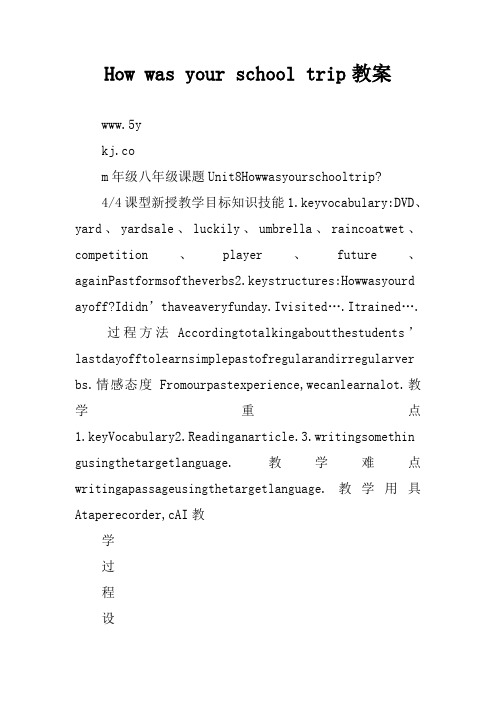
How was your school trip教案www.5ykj.com年级八年级课题Unit8Howwasyourschooltrip?4/4课型新授教学目标知识技能1.keyvocabulary:DVD、yard、yardsale、luckily、umbrella、raincoatwet、competition、player、future、againPastformsoftheverbs2.keystructures:Howwasyourd ayoff?Ididn’thaveaveryfunday.Ivisited….Itrained….过程方法Accordingtotalkingaboutthestudents’lastdayofftolearnsimplepastofregularandirregularver bs.情感态度Fromourpastexperience,wecanlearnalot.教学重点1.keyVocabulary2.Readinganarticle.3.writingsomethin gusingthetargetlanguage.教学难点writingapassageusingthetargetlanguage.教学用具Ataperecorder,cAI教学过程设计教学内容及教师活动学生活动设计意图Step1.Greetings1.checkthecompositionthestudentshave writtenabouttheirlastdayoff.Askstudentstoreaditalou dtotheirpartnersfirstandthenreadforallthestudents.2 .Readtheoldwordsandcorrectthepronunciation.Step2Pre sentationI.wordstudy1.Teachergivethechinesemeaningo fthisperiodletstudentsgivetheEnglishDVD、yard、yardsale、luckily、umbrella、raincoatwet、competition、player、future、againII.3a1.LetstudentsreadtheletterwhichNickwrotetoTomandgivet heopinionsabouttheday.2.Letstudentsreadtheletteragaintoturnitintoaconversat ion.III.3b1.SupposeyouareTomandwritethislettertoNic k.Pleasegoovertheletterandfillintheblanks.2.Self-ch eckLetstudentsfillintheblanksinpart1andpayattention tothetensesandformsofthewordsuchasaboutlivinginthef uture.3.Letstudentswriteacompositioninoralaccording totheinformationonthebook.Step3consolidationandexte nsionI.Pairwork41.Letstudentsreadtheircompositionforanother.2.Letstudentsusethegivenphrasestoasktheirpartnersques tionsaccordingtothearticlethattheyhavewrittenDid…?what…?werethere…?where…?Howwas (3)Letstudentsdosomeexercises翻译下列句子。
Unit8 How was your school trip?教学设计与反思(杨洪国)
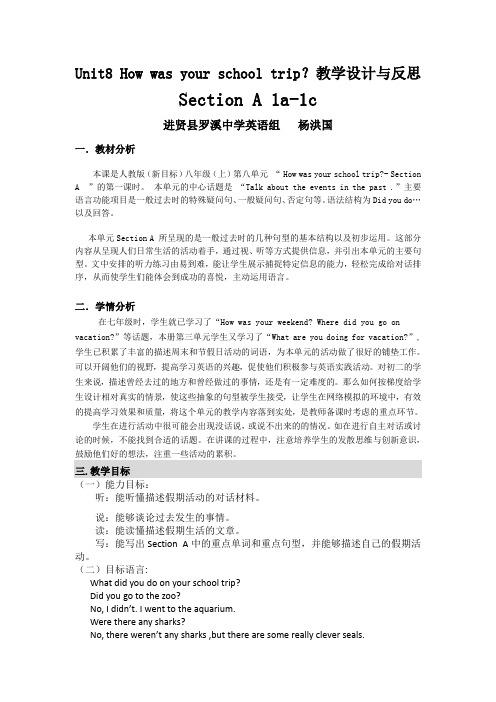
Unit8 How was your school trip?教学设计与反思Section A 1a-1c进贤县罗溪中学英语组杨洪国一.教材分析本课是人教版(新目标)八年级(上)第八单元“ How was your school trip?- Section A ”的第一课时。
本单元的中心话题是“Talk about the events in the past .”主要语言功能项目是一般过去时的特殊疑问句、一般疑问句、否定句等。
语法结构为Did you do…以及回答。
本单元Section A 所呈现的是一般过去时的几种句型的基本结构以及初步运用。
这部分内容从呈现人们日常生活的活动着手,通过视、听等方式提供信息,并引出本单元的主要句型。
文中安排的听力练习由易到难,能让学生展示捕捉特定信息的能力,轻松完成给对话排序,从而使学生们能体会到成功的喜悦,主动运用语言。
二.学情分析在七年级时,学生就已学习了“How was your weekend? Where did you go on vacation?”等话题,本册第三单元学生又学习了“What are you doing for vacation?”,学生已积累了丰富的描述周末和节假日活动的词语,为本单元的活动做了很好的铺垫工作。
可以开阔他们的视野,提高学习英语的兴趣,促使他们积极参与英语实践活动。
对初二的学生来说,描述曾经去过的地方和曾经做过的事情,还是有一定难度的。
那么如何按梯度给学生设计相对真实的情景,使这些抽象的句型被学生接受,让学生在网络模拟的环境中,有效的提高学习效果和质量,将这个单元的教学内容落到实处,是教师备课时考虑的重点环节。
学生在进行活动中很可能会出现没话说,或说不出来的的情况。
如在进行自主对话或讨论的时候,不能找到合适的话题。
在讲课的过程中,注意培养学生的发散思维与创新意识,鼓励他们好的想法,注重一些活动的累积。
三.教学目标(一)能力目标:听:能听懂描述假期活动的对话材料。
八年级英语Unit 8 How was your school trip?新人教版

Unit 8 How was your school trip?一、知识目标1)教学生掌握动词的过去式中规则动词和不规则动词的变化形式2) 教学生掌握一般过去时的肯定句,否定句及一般疑问句3)教学生掌握运用一般过去时描述过去发生的事情二、能力目标1)听:能听懂描述假期活动的对话材料。
2)说:能够谈论过去发生的事情。
3)读:能读懂描述假期活动的文章。
4)写:能写出SectionA和Section B中的重点单词和重点句型,并能够描述自己的假期活动。
三、策略目标1) 教学生学会通过看、听、说和讨论来获取已有的信息。
(看图作问答)2)通过小组活动学习,学生能自由谈论自己做过的事。
(个体与群体思维)3)通过本单元谈论过去发生的事情,可从谈论学校郊游引出话题,从而导入一般过去时的使用,学会描述过去做过的事情。
(个性化学习)四、德育目标1)通过本单元的学习,对比过去与现在,培养良好的行为习惯。
2)通过生态旅游学习,学会保护大自然,陶冶情操。
五、重点与难点1)重点:掌握一般过去时的一般疑问句形式:a. Did you +动词原形…?b.Were you +表语…?2)难点:规则动词的过去式与不规则动词把握及运用。
a.规则动词:1)一般情况动词后加-ed: ask—asked2)有e结尾加-d:dance—danced3)双写情况再加-ed:stop—stoppedb.不规则动词:have—had, go—went, do—did, are—were六、教学准备1)some pictures about places of great interest2) A tape-recorder, multi-medium,3)教学课时为五课时第一课时(The First Period) Look, speak and Listen for Section A一、Teaching process designStep 1: Warming up and lead inGreeting and show students some pictures about places of interest such as the Great Wall, Tian’anmen Square, Jiouzaigou.Lead in with such questions: 1. Do you enjoy your holiday? –Yes, very much. 2. Did you go to the places which are shown in the pictures? Yes, I did. 3.When did you go there? Last holiday. 4.What did you do there? I took photos and bought a souvenir. Who did you go with? With my parents.They may elicit various answers. Ask students to work in groups to make a list about where to go for their last school trip and what to do there.Then the teacher focuses on the picture and asks students:T: Who is the girl with a shark on her head?S: She is Tina.T: Where did she go for her last school trip?S: She went to the aquarium.T: What did she do there?S: She took photos, saw some seals, bought a souvenir, ate some ice cream, … and so on.Next, the teacher leads students to practice listening. Everybody has his own way to enjoy his school trip like Tina’s. The experience of each person is quite different from the others’. They may go to the zoo or go to the aquarium. Let’s listen to the tape in 1b and see where Tina went and what she did there. The tape is about Tina’s partner is asking Tina about her last school trip. Ask students to listen to the recorder carefully and circle the expressions in the box.After listening,the teacher lists what students heard with a form on the blackboard to check the answers like this:Then get students to learn the irregular form of the past verbs:Go—went, take—took, have—had, eat—ate, hang—hung, see—saw, buy—bought, are—were,do—didStep 2: PairworkBefore working in pairs, students should remember the expressions in 1b. Give students a few minutes to review the expressions. After that ask students to discuss what the children in the picture do on their last school trip to follow the sample dialogue:A: Look at Tina. What did she do on her last school trip?B: She went to the aquarium.A:What did she see there?B:She saw some smart seals.A: I like smart seals, but I never go there. Did she see any sharks?B: No, there weren’t any sharks.A: Did she buy a souvenir?B: No, she didn’t. Her friend Grace bought a souvenir.A: Did she hang out with her friends there?B: No, she didn’t. She took photos.A: Did she have pizza?B: No, she ate some ice cream.The teacher moves around the classroom and give some help as needed. Ask pairs of students to show their work. Praise them for their excellent work.Step 3: Look, Listen and Write2a & 2b provide guided listening and writing practice using the target language. The teacher asks students to listen to the tape and check the questions they hear with “∨”.1.____ Did you buy that hat?2._____ Did you win that hat?3.____ Did you take any photos?4.____ Did you get his autograph?5. ____ Did you see any sharks?6.____ Were there any seals?7. ____ What else did you do?Ask students to pay attention to the structures of the sentences. Explain the underlined parts to students.And tell the difference between them.Did + subject +original verb…?Affirmative answer:Yes, I/we/they/she/he did.Negative answer:No, I/we/they/she/he didn’t.Wh-word +did + subject +original verb…?Answer Wh-question with a statement sentenceWere +there + noun pl…?Affirmative answer:Yes, there were. Negative answer:No, there weren’t.Now ask students to listen to the tape and circle “T” or “F” while they are listening.Then check the answers with students by asking students some questions like this:T: Did Tina meet a famous actor?S: Yes, she did.T: Did Tina get Jake Dean’s autograph?S: Yes, She did.T: Did Toby win a prize?S: No, he didn’t.T: Did Tina win a hat?S: Yes, she did.T: Were there many actors at the aquarium?S: No, not too many.T: Thank you all.Then ask students to make sentence transformation from a state ment sentence to a “Yes or No”question with the sentences given in 2b:Answers: 1. Did Tina meet a famous actor?2. Did Tina get Jake Dean’s autograph?3. Did Toby win a prize?4. Did Tina win a hat?5. Were there many actors at the aquarium?And list the past forms of the irregular verbs: meet—met, get—got, win—won, are--were. Then read them. (Finish 2b)Step 4: Practice with pair workAsk students to make a dialogue by asking and answering questions according to the information in activity 2b in order tostart oral practice using the target language with the following sample like this:A: Did Tina meet a famous actor?B: Yes, she did. She met Jake Dean.A: What did Tina get from Jake Dean?B: She got an autograph.A: Did Tina win a prize?B: No, she didn’t. She won a hat.A: Were there many actors at the aquarium?B: No, not too many.Then ask students to work in pairs and practice the conversation above. While students are working, the teacher is moving around the room giving some help as needed. Ask pairs of students to show their works. Praise them for their good works.(finish 2c)Step 5: Homework1) Sum up the Past Tense sentence & the past forms of the irregular verbs.2) Preview 3a ,3b & 4 on Page 49.二、Word Explanation1. else adv.其他,另外,别的。
Unit8 How was your school trip

Unit8How was your school trip?桂平市厚禄一中程业利Teaching goals:1.Review the past tense.2.Students learn to talk about events in past .Key points:1.一般过去式的疑问句2.动词过去式的构成规则3.some和any 的区别4.There be 句型的过去式Teaching steps:Ⅰ.Ask students to read the new words in page 8.Ⅱ.Review the past tense.1.定义:表示过去某个时间发生的动作或存在的状态,常和表示过去的时间状语连用。
2.标志:yesterday the day before yesterday in 1990two days ago last week/night/year/mont h……3.结构:肯定句:主语+动词的过去式+其他例如:He went swimming with his son yesterday.否定句:主语+be(was/were)+not+其他主语+didn’t +动词原形+其他例如:①He wasn’t a teacher two years ago.②He didn’t go to the park yesterday .疑问句:一般疑问句是将be提前或者加助动词did特殊疑问句由“特殊疑问词+一般疑问句”构成例如:①Was he a teacher two years ago?②Didn’t he go to the park yesterday?4.动词过去式的构成规则变化:⑴一般在动词末尾加ed⑵以e结尾的动词加d.⑶以重读闭音节结尾的动词,双写后面的辅音字母,再加ed.⑷以辅音字母加y 结尾的动词,把y变为i再加ed5.Write down some words in the blackboard .visit see studystop watch takeplay live planⅢ .Come to Grammar Focus.1.Students read the sentences by themselves.2.Go though some grammar.⑴some :用于肯定句和表示请求、建议的疑问句中例如:would you like some tea?any :用于否定句和疑问句⑵were there 是are there的过去式was there 是is there的过去式①回答要注意时态的一致性②如果有两个以上的名词做主语,be通常由靠近动词的那个名词决定例如:There_agirl and two boys in the room.⒊ Students read the sentences againⅥ.Give some exercises to students1.Did you visit the Great Wall?Yes ,I _A .doB .does C.doing D.did2.There_a pencil and two pens in my pencil case last week.A.isB.areC.wasD.were3.He_a letter to Dick in 2008.A.writesB.is writingC.wroteD.writed4.I’m hungry.I want_to eat.A.anythingB.somethingC.everythingD.nothing5.Do you have_to say?A .important anything B.anything importantC.important somethingD.something important6. Was there a nice picture on the wall?_________A.No,there isn’tB.No,there weren’tC.No,there wasn'tD.No,there are’t7. He saw some dogs.(改为一般疑问句)8. Mary was a good student in 2008.(改为一般疑问句)Ⅶ.Summarize板书设计:一、一般过去时二、Grammar Focus1.定义 1. some :用于肯定句和表示请求、建议的疑问句中2.标志:yesterday the day before yesterday in 1990 any :用于否定句和疑问句two days ago last week/night/year/month--- 2. were there 是are there的过去式3.结构: was there 是is there的过去式肯定句:主语+动词的过去式+其他三、练习否定句:主语+be(was/were)+not+其他主语+didn’t +动词原形+其他疑问句:一般疑问句是将be提前或者加助动词did特殊疑问句由“特殊疑问词+一般疑问句”构成4.动词过去式的构成教学反思:这节课主要是学习本单元的Grammar Focus,以及复习一般过去时。
人教版八年级上册第8单元英语知识点

Detailed Solution for Unit 8How was your school trip ?【重要词汇详解】1. prize /praIz/n.奖赏,奖品:He won the first prize in the speech contest.【注意与price(价格)的区别。
】☆win a prize获奖2.visitor /5vIzItE/n.访问者,来客the Visitors’ Center [记忆] visit + or3.outdoor /5aJtdC:/adj.户外的,野外的[记忆]out + door(门)。
[引申] 反义词:indoor。
4.octopus /5CktEpEs/n. “章鱼” ☆an octopus5.end /end/n.& v. 结束意为结束某一进程,其后不跟其他动词。
①n. at the end of … e.g. at the end of the concert (时间) at the end of the street (地点)【in the end = at last = finally 最后In the end, we were very tired.】②v. Mr Smith ended the class with a song .[考点] finish 完成某事或一动作。
后跟名词、代词或动名词。
finish doing sth.6. luck /lQk/n.“幸运”Good luck! → lucky adj.“幸运的”lucky bird → luckily adv.7. off /Cf/adj. “休息”day off on my next day offtake…off I’d like to take the afternoon off8. future /5fju:tFE/n.将来,未来:I hope you have a happy future before you.[考点]辨析in the future与in future:in the future指“在将来”;in future指“从今以后”e.g. I want to be a doctor in the future. You should study hard in future.【重要词组概览】1. hang out with one’s friends和朋友闲逛2. at the aquarium 在水族馆3. take photos=take a photo=take pictures=take a picture照相4. get one’s autograph得到了某人的亲笔签名5. win a prize / hat赢得奖品(帽子)6.on the school trip在学校的旅游7. have a great time 玩得愉快8. watch a dolphin show看一场海豚表演9. after that那以后10. at the end of…在…结束;在…末尾→at the beginning of…11. sleep late睡过头 12. go for a drive 开车兜风13. all day 一整天14. (on the) day off (因病或节假日)休息15. a yard sale 庭院旧货出售16. see you soon盼望很快见到你17. come back from…从…回来18. in the future “在将来” 19. none of them 一个都没有【重要句型概览】1. What did you do on your school trip?2. Did you go to the zoo? No., I didn’t. I went to the aquarium.3. Did you see any seals? Yes, I saw some seals.4. Were there any sharks? No, there weren’t any sharks; but there were some really smart seals.5. What else did you do?6. How was your day off?【语法知识聚焦】一般过去时:主要用来表示过去发生的动作或状态。
人教版英语八年级上册Unit 8听力原文及翻译(旧版)
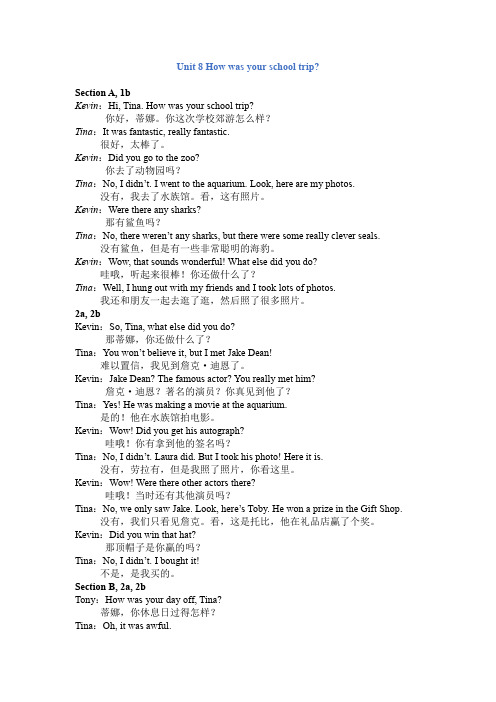
Unit 8 How was your school trip?Section A, 1bKevin:Hi, Tina. How was your school trip?你好,蒂娜。
你这次学校郊游怎么样?Tina:It was fantastic, really fantastic.很好,太棒了。
Kevin:Did you go to the zoo?你去了动物园吗?Tina:No, I didn’t. I went to the aquarium. Look, here are my photos.没有,我去了水族馆。
看,这有照片。
Kevin:Were there any sharks?那有鲨鱼吗?Tina:No, there weren’t any sharks, but there were some really clever seals.没有鲨鱼,但是有一些非常聪明的海豹。
Kevin:Wow, that sounds wonderful! What else did you do?哇哦,听起来很棒!你还做什么了?Tina:Well, I hung out with my friends and I took lots of photos.我还和朋友一起去逛了逛,然后照了很多照片。
2a, 2bKevin:So, Tina, what else did you do?那蒂娜,你还做什么了?Tina:You won’t believe it, but I met Jake Dean!难以置信,我见到詹克·迪恩了。
Kevin:Jake Dean? The famous actor? You really met him?詹克·迪恩?著名的演员?你真见到他了?Tina:Yes! He was making a movie at the aquarium.是的!他在水族馆拍电影。
新目标人教版八年级英语上Unit8Howwasyourschooltrip学案

新⽬标⼈教版⼋年级英语上Unit8Howwasyourschooltrip 学案Unit 8 How was your school trip姓名:第⼀课时Section A (1a—2c)⼀、教师寄语:There will be no regret and sorrow if you fight with all your strength. (只要全⼒拼搏了,就没有遗憾,没有后悔。
)⼆、学习⽬标知识⽬标:1. 词汇:gift, shark, aquarium , seal, souvenir , hang, hang out, win ,(won ), autograph, prize.2. 语⾔:How was your school trip? Did you win that hat? Were there any sharks?3. 语法:学习⼀般过去时及There be 句型的⼀般过去时能⼒⽬标: 学会询问“……怎么样、做了什么事”三、教学重点、难点:学习⼀般过去时, 及规则和不规则动词的过去式。
⼀般过去时的⽤法.四、学习过程:Step 1 预习导学或⾃测,按要求写出下列各词:1. visit______(过去式)2. photo________(复数)3. take________(反义词)4. put________(过去式)5. pour________(现分词)6. win________(过去式)7. gift________(同义词)8. fun________(形容词)9. begin________(同义词)10. wild________(⽐较级)11. athletic________(⽐较级12. where______(同⾳词)13. near________(反义词)14. leave________(过去式)15. she________(名物代词)16. sick________(同义词)17. right________(同⾳词)8. foot________(复数)19. they________(宾格)20. knife________(复数)Step 2 语法:⼀般过去时⼀般过去时指在过去某⼀段时间内发⽣的动作或存在的状态,常和表⽰过去意义的时间状语连⽤.1.⼀般过去时:动词⼀般过去时,表⽰过去发⽣的事;be⽤was或⽤were, have,has变had;谓语动词过去式,过去时间作标志;⼀般动词加-ed,若是特殊得硬记。
- 1、下载文档前请自行甄别文档内容的完整性,平台不提供额外的编辑、内容补充、找答案等附加服务。
- 2、"仅部分预览"的文档,不可在线预览部分如存在完整性等问题,可反馈申请退款(可完整预览的文档不适用该条件!)。
- 3、如文档侵犯您的权益,请联系客服反馈,我们会尽快为您处理(人工客服工作时间:9:00-18:30)。
Then they watched a dolphin show.(观看 海豚展)
After that, theywent to the Outdoor Pool (去 户外游泳)and saw a big octopus (看见 了大章鱼).
After lunch, they went to the Gift Shop (去礼品店)and bought lots of gifts.
3a
Read the article and correct the statements below.
1.The students had a terrible school trip. × great 2. They saw an octopus in the Visitors’ Center. × Outdoor Pool 3. They took the subway back to school. × bus 4. The students watched a movie about dolphins. × 5. The science teacher cleaned the bus. sharks × class montior
Finally, tired but happy, they took the bus back to school (乘公交车 返回学校).
At the end of the day (在那 天结束时), the science teacher was very happy because the class monitor cleaned the bus. after the trip (旅行后)
Class 9’s Route
First Visitors’ Center
and
At the end of the day
Finally school
After lunch
Then Af适当形式填空。 My last school day Let me tell you something about my last school day. was It __________(be) really interesting and useful. First got I ________ (get) up at 6:00 and ate ______(eat) breakfast took at 6:15. At 6:30 I ______(take) No.3 Bus to school. took Then had It _____(take) me 15 minutes. _______, I ______(have) my morning classes. After morning classes, I ate lunch and played basketball with my classmates. We really Finally love basketball! __________, I had to have my afternoon classes such as art ,music and computer science. At the end They are very interesting and useful. _______ of the day _, walked I _________(walk) home. This is my last schoheol day! What do you think of it?
Read the article
on Class 9 had a great time (玩得开心) the school trip. (在学校旅行中)They went to Blue Water Aquarium 蓝 ( 色水族馆)for the day. First theyvisited the Visitors’ Center(参 观游客中心)and watched a movie about sharks (观看一部关于鲨鱼的 电影).
首先划出3a文中使用过去式的动词并在它们下边空格的地方 写出它们的原形,然后再翻译下列词组并同小组一起大声朗 读识记它们。你可参照单词表的帮助。 买一份纪念品 buy a souvenir ; have a great time 玩得高兴__________________; 在学校旅行中_______________; on the school trip 蓝色水族馆________________________; Blue Water Aquarium 参观游客中心__________________________; visit the Visitors’ Center watch a movie about sharks 观看一部关于鲨鱼的电影_____________________________; watch a dolphin show 观看海豚展________________________; go to the 去户外游泳_______ Outdoor Pool _ the Gift Shop a big octopus 一只大章鱼_________________;礼品店__________________ take the bus back to school 乘公交车返回学校________________________; at the end of the day ;班长______monitor ; class 那天结束时________________ after the trip 。 旅行后_________
